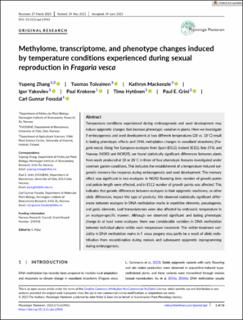| dc.contributor.author | Zhang, Yupeng | |
| dc.contributor.author | Toivainen, Tuomas | |
| dc.contributor.author | Mackenzie, Kathryn | |
| dc.contributor.author | Yakovlev, Igor | |
| dc.contributor.author | Krokene, Paal | |
| dc.contributor.author | Hytönen, Timo | |
| dc.contributor.author | Grini, Paul | |
| dc.contributor.author | Fossdal, Carl Gunnar | |
| dc.date.accessioned | 2024-01-17T15:49:50Z | |
| dc.date.available | 2024-01-17T15:49:50Z | |
| dc.date.created | 2023-08-07T09:45:46Z | |
| dc.date.issued | 2023-06-21 | |
| dc.identifier.citation | Physiologia Plantarum : An International Journal for Plant Biology. 2023, 175 (4), . | en_US |
| dc.identifier.issn | 0031-9317 | |
| dc.identifier.uri | https://hdl.handle.net/11250/3112300 | |
| dc.description.abstract | Temperature conditions experienced during embryogenesis and seed development may induce epigenetic changes that increase phenotypic variation in plants. Here we investigate if embryogenesis and seed development at two different temperatures (28 vs. 18°C) result in lasting phenotypic effects and DNA methylation changes in woodland strawberry (Fragaria vesca). Using five European ecotypes from Spain (ES12), Iceland (ICE2), Italy (IT4), and Norway (NOR2 and NOR29), we found statistically significant differences between plants from seeds produced at 18 or 28°C in three of four phenotypic features investigated under common garden conditions. This indicates the establishment of a temperature-induced epigenetic memory-like response during embryogenesis and seed development. The memory effect was significant in two ecotypes: in NOR2 flowering time, number of growth points and petiole length were affected, and in ES12 number of growth points was affected. This indicates that genetic differences between ecotypes in their epigenetic machinery, or other allelic differences, impact this type of plasticity. We observed statistically significant differences between ecotypes in DNA methylation marks in repetitive elements, pseudogenes, and genic elements. Leaf transcriptomes were also affected by embryonic temperature in an ecotype-specific manner. Although we observed significant and lasting phenotypic change in at least some ecotypes, there was considerable variation in DNA methylation between individual plants within each temperature treatment. This within-treatment variability in DNA methylation marks in F. vesca progeny may partly be a result of allelic redistribution from recombination during meiosis and subsequent epigenetic reprogramming during embryogenesis. | en_US |
| dc.language.iso | eng | en_US |
| dc.publisher | John Wiley & Sons Ltd on behalf of Scandinavian Plant Physiology Society | en_US |
| dc.rights | Attribution-NonCommercial-NoDerivatives 4.0 Internasjonal | * |
| dc.rights.uri | http://creativecommons.org/licenses/by-nc-nd/4.0/deed.no | * |
| dc.title | Methylome, transcriptome, and phenotype changes induced by temperature conditions experienced during sexual reproduction in Fragaria vesca | en_US |
| dc.type | Peer reviewed | en_US |
| dc.type | Journal article | en_US |
| dc.description.version | publishedVersion | en_US |
| dc.rights.holder | © 2023 The Authors | en_US |
| dc.source.volume | 175 | en_US |
| dc.source.journal | Physiologia Plantarum : An International Journal for Plant Biology | en_US |
| dc.source.issue | 4 | en_US |
| dc.identifier.doi | 10.1111/ppl.13963 | |
| dc.identifier.cristin | 2165157 | |
| dc.relation.project | Norges forskningsråd: 249958 | en_US |
| dc.source.articlenumber | e13963 | en_US |
| cristin.ispublished | true | |
| cristin.fulltext | original | |
| cristin.qualitycode | 1 | |

